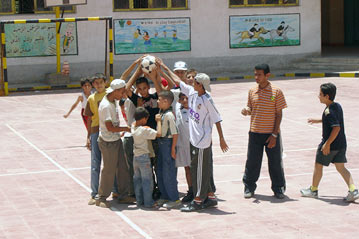Many of the estimated 70,000-150,000 Iraqi refugees in Egypt have developed serious psychological and stress-related illnesses, including cardiac problems, according to Ahlam Tobia, a medical doctor who works with refugees in Cairo.
Abeer Etefa, the UN Refugee Agency (UNHCR) spokesperson, said many of the refugees registered with the agency had chronic diseases such as heart ailments and diabetes.
“Stress caused by bad news from back home, by lack of funds, employment or education opportunities, has caused an increase in cases of heart disease and diabetes,” Ahlam said.
Iraqi refugees, she said, had a higher rate of medical problems compared to other refugee populations, such as the Sudanese and Somalis. Iraqi children also had health problems unique to their population, which Ahlam believed were attributable to radioactive waste left over from Iraq’s war with Iran and the first Gulf War in 1991.
Human horror stories exist among Iraqi refugees - from women who have lost their power of speech due to shock, to children with stunted growth, to young boys who are losing their hearing or sight. One person has a congenital disease and is losing mobility due to deteriorating brain membranes, Ahlam said.
“In other refugee communities congenital diseases are very rare - maybe we find an abnormality of one in a 100,” she said. “Among the Iraqis, I see them in the tens.”
Psychiatric problems are also a growing cause for alarm within the Iraqi population in Egypt, Etefa said. Post-traumatic stress is increasingly becoming a problem.
“There certainly are an increased number of cases that have psychological problems because they are survivors of violence or they were kidnapped,” Etefa said.
These may seem trifling compared to physical deformities, but the mental health of the refugees is a much neglected area.
Poverty among the Iraqi refugees is exacerbating their health problems, and the fact that non-governmental organisations - including Africa and Middle East Refugee Assistance (AMERA) and Caritas - have limited funds, has meant many have had to fend for themselves. The UNHCR also has budget limitations, Etefa said.
Personal testimony
Nada (not her real name), a refugee who arrived in Egypt about two and a half years ago with her husband and four daughters, has been struggling to survive. She and her family decided to move out of Cairo to cut down on costs (she now lives in a town 150km away).
As her daughter was born with enlarged kidneys, she has to take her to Cairo for tests and treatment every four to five months - a far cry from the monthly treatment the girl used to receive in Iraq.
“We had a lot of doctors in Iraq who could see to her problem. Every month I used to take her to do a test, but here I cannot. We cannot work, and I cannot afford her kidney medicine.”
Resettlement
War-torn Iraq has also brought refugees to Egypt with amputated limbs; others need bullets removing. Some are incontinent due to the things they witnessed in Iraq, said Ahlam.
 Photo: A.Etefa/UNHCR  |
| One fortunate Iraqi prepares bread in his new bakery in the 6th of October City near Cairo. Specialists say poverty among Iraqi refugees is exacerbating their health problems |
Refugees who register with the UNHCR are given some assistance, and the organisation generally pays a large portion of the cost of treatment and medication. If surgery or treatment exceeds a certain cost, they cannot be helped by the UNHCR and are referred for resettlement. This is particularly true of cancer patients and cases requiring sophisticated surgery, Etefa said.
“Resettlement is a long process,” Etefa said. “We have really been calling for expediting the process of resettlement because a lot of people have been waiting for a long time.”
In 2007, Etefa said, about 22,000 Iraqis were referred for resettlement, but so far, only about one third of them have been resettled.
sk/ar/cb
This article was produced by IRIN News while it was part of the United Nations Office for the Coordination of Humanitarian Affairs. Please send queries on copyright or liability to the UN. For more information: https://shop.un.org/rights-permissions





